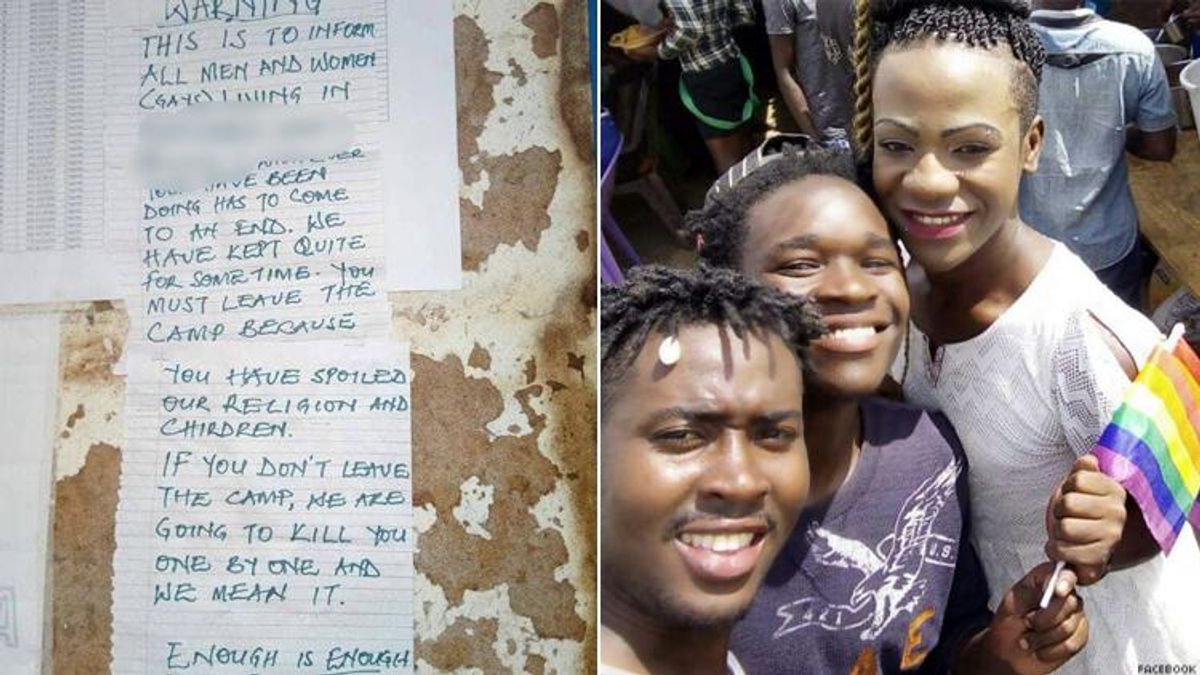World
Kenya's First Pride Is Greeted With Death Threats

Joy quickly turned to fear at the Kakuma Refugee Camp.
Mary Grace Lewis
June 23 2018 2:47 PM EST
June 23 2018 2:54 PM EST
By continuing to use our site, you agree to our Private Policy and Terms of Use.

Joy quickly turned to fear at the Kakuma Refugee Camp.
Organizers and attendees of the first Pride event in the Kakuma Refugee Camp in Kenya, held last week, received anonymous messages threatening their lives.
The camp was established by the United Nations Refugee Agency in 1992 in northwestern Kenya. Kakuma and its expansion camp, the Kalobeyei Integrated Settlement, hold about 185,000 people.
Mbazira Moesa, a Ugandan refugee who helped organize the camp's first Pride event June 15, wanted the LGBT residents to celebrate openly in spite of the camp's population being dominated by Islamic settlers and refugees from South Sudan, Somalia, and Ethiopia, whose cultures condemn homosexuality.
Along with other members of Refugee Flag Kakuma, an LGBT organization based in Uganda, Moesa wanted to confront "the ignorance" and "myths" held and perpetuated by so much of the camp's population, he told NBC News.
About 600 people attended the celebration, and despite attacks on a lesbian and a transgender person, Mbazira expressed hope that the event would carry on annually.
Unfortunately, the Pride event was followed by death threats pinned on the notice boards in the camp, warning LGBT refugees to "leave the camp" or "we are going to kill you one by one" and including similarly hateful messages such as "This is warning to all men and women (gays) living in Kakuma" and "What you have been doing has to come to an end. We have been quiet for some time. You have to leave the camp because you have spoiled our children and our religion."
Since the notes have been posted, LGBT people in the camp have been living in fear. Many did not show up to work in the days following the messages being posted, and some are planning on fleeing to Nairobi, Kenya's capital, until they feel it is safe to return to Kakuma.
The threatening messages have left residents of the camp "in fear, desperate, and indoors with anticipations of violence at any time any day," Moesa told Gay Star News.
Moesa fled Uganda when he was 23 due to the country's homophobia. Moesa says he was beaten and arrested on multiple occasions, and it was the violent raiding of a gay social event in 2016 that made him retreat to Kenya. After reaching Nairobi, Moesa was transferred to Kakuma; however, he said he does not feel much safer in the camp than he did back in Uganda.
"I feel myself to be under constant threat," Moesa told NBC News, stressing the lack of protection that LGBT refugees experience.
Maria Sjodin, executive director of the LGBT human rights organization OutRight Action International, confirmed that there is little protection for LGBT refugees.
"The systems set up are often not equipped to provide the necessary protection," Sjodin told NBC News. "Many individuals who face persecution and violence at home because of their sexual orientation or gender identity end up in refugee centers surrounded by people from the very same homophobic and transphobic cultures and countries from which they fled."
Here's our dream all-queer cast for 'The White Lotus' season 4